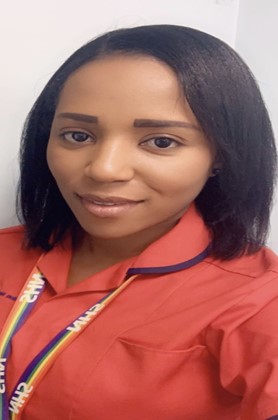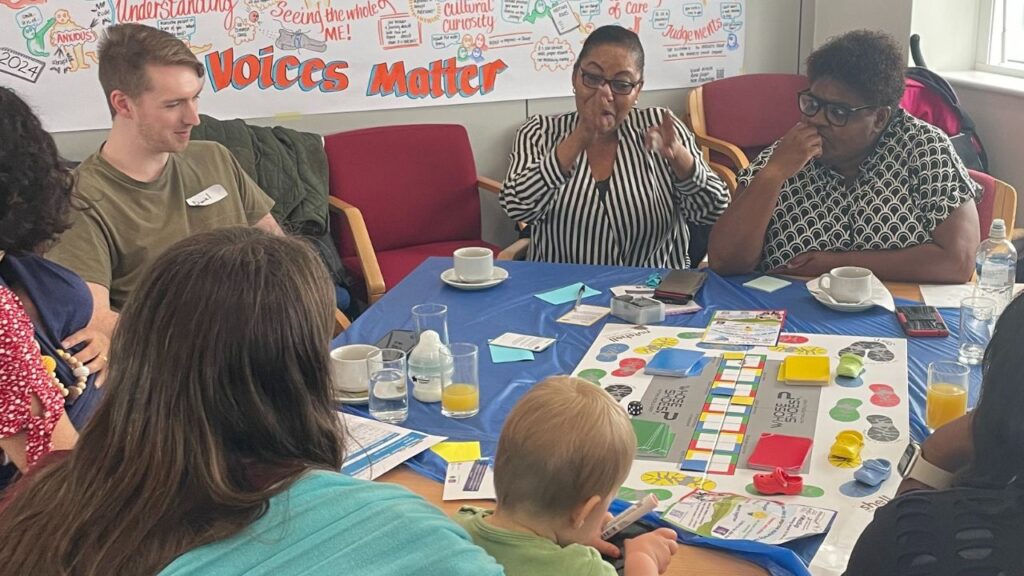It’s about “making ourselves accountable for how we work alongside local people,” says consultant midwife Memuna Sowe (below) from Croydon Health Services NHS Trust on Whose Shoes? a new way of engaging with women about maternity services.
“Yes, we give out surveys,” she said. “But how do we really support women to have a voice so we can tailor our services around everybody?

“As a consultant midwife, I can come up with ideas. However, I strongly believe that to actually hear the voices of the population, we need to understand their experiences. It’s the only way we can adapt our services to suit those needs.”
In May 2024, a report by the UK’s all-party parliamentary group on birth trauma called for an overhaul of maternity care in the UK. There were reports from across the country of women not feeling listened to when they expressed concerns that something was wrong. Some women from ethnic minority groups, in particular, reported experiencing poor care including direct and indirect racism.
For Memuna and others committed to changing that, it all starts with understanding women’s experiences – and having some honest conversations.
I strongly believe that to actually hear the voices of the population, we need to understand their experiences. It’s the only way we can adapt our services to suit those needs.”
Over the past few months four south west London hospitals, Croydon, Kingston, St George’s and Epsom and St Helier brought together families with midwives, doctors, sonographers and other staff involved with maternity care as well as community organisations.
Staff had time away from their clinics and hospital wards to explore views through a unique discussion board game aimed at getting to the heart of issues affecting care. Known as ‘Whose Shoes?’, the game helps spark conversations between people in health settings.
Madeline Lenchner is NHS South West London’s maternity core connector. Her role involves addressing unequal access to maternity care, focusing on marginalised communities.
Whose Shoes? helps to promote deep conversation about topics that may at times be difficult.”
She explained: “Whose Shoes? helps to promote deep conversation about topics that may at times be difficult. It features scenario cards and poems. You move around the board reading the cards together and discussing them. All the cards feature things real people have said, to stimulate debate.”
According to Madeline: “The direct nature of the cards, calling out challenging issues and poor communication, affects people in very strong ways. During the intro we talk about how some of what we read on these cards will create emotive responses but we’re here to support one another, making the space as welcoming as possible and addressing everyone’s perspective.”

Different versions of the game address a range of birth experiences. They include a pack that’s been designed for women from black and ethnic minority communities, a neonatal pack for families whose child received additional care at birth, and one aimed at those with major medical conditions while pregnant.
Says Madeline: “A number of clinical staff had not heard these types of conversations before. Some staff listened to the comments and said, ‘this would never happen’. But we had service users responding, ‘this has happened to me’. You could see the impact of those stories.”
It’s about having someone just listen and acknowledge your experience, good or bad.”
For many new parents, the need to recount their birth experience is an important part of adjusting to such a major life event. Madeline adds: “It’s about having someone just listen and acknowledge your experience, good or bad. Some cards are light, ‘I had an amazing birth, a wonderful relationship with my midwife’. It’s about success stories as well as the things that need to change.”
Zeynep, who had baby Ronnie in March after a long and stressful labour joined the St Helier Hospital event. She said: “This game is a nice way to hear different perspectives, to get together with other new mums, as well as midwives and NHS staff to listen to their stories; to have our voices heard.
“As first-time mums, everyone struggles. You don’t know what to expect from labour and breast feeding but I really think talking to experienced mums can help. Since the event I’ve offered to share my experiences with others, to share tricks and the things they need to know.”
Every session resulted in a series of pledges – big and small, ranging, from staff making eye contact while taking notes to a promise of better disability access in maternity care. Other examples included:
- recording videos explaining medical terms
- a staff member pledging to learn a new language to support women
- no use of abbreviations
- being more aware of body language, mood and tone of voice and how these are perceived
Diane Weir is a lead midwife at Epsom and St Helier University Hospitals NHS Trust. She joined the event at St Helier Hospital focused on maternity and neonatal care. She said: “The board game format really helped people open up and talk about the issues that matter to them – and got us all thinking.
“Discussions in our groups ranged from helping women understand the health system to the impact of technology. Participants emphasised the need to avoid making assumptions – to ensure we really listen to each other.”
In total, 150 people took part in the four events. The hospital trusts own the materials and can use them in the future, however, work to evaluate the results and implement the pledges is now underway.
